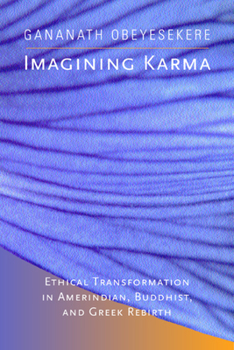Imagining Karma: Ethical Transformation in Amerindian, Buddhist, and Greek Rebirth
(Part of the Comparative Studies in Religion and Society Series)
Select Format
Select Condition 
Book Overview
With Imagining Karma, Gananath Obeyesekere embarks on the very first comparison of rebirth concepts across a wide range of cultures. Exploring in rich detail the beliefs of small-scale societies of West Africa, Melanesia, traditional Siberia, Canada, and the northwest coast of North America, Obeyesekere compares their ideas with those of the ancient and modern Indic civilizations and with the Greek rebirth theories of Pythagoras, Empedocles, Pindar, and Plato. His groundbreaking and authoritative discussion decenters the popular notion that India was the origin and locus of ideas of rebirth. As Obeyesekere compares responses to the most fundamental questions of human existence, he challenges readers to reexamine accepted ideas about death, cosmology, morality, and eschatology.
Obeyesekere's comprehensive inquiry shows that diverse societies have come through independent invention or borrowing to believe in reincarnation as an integral part of their larger cosmological systems. The author brings together into a coherent methodological framework the thought of such diverse thinkers as Weber, Wittgenstein, and Nietzsche. In a contemporary intellectual context that celebrates difference and cultural relativism, this book makes a case for disciplined comparison, a humane view of human nature, and a theoretical understanding of "family resemblances" and differences across great cultural divides.
Obeyesekere's comprehensive inquiry shows that diverse societies have come through independent invention or borrowing to believe in reincarnation as an integral part of their larger cosmological systems. The author brings together into a coherent methodological framework the thought of such diverse thinkers as Weber, Wittgenstein, and Nietzsche. In a contemporary intellectual context that celebrates difference and cultural relativism, this book makes a case for disciplined comparison, a humane view of human nature, and a theoretical understanding of "family resemblances" and differences across great cultural divides.
Format:Paperback
Language:English
ISBN:0520232437
ISBN13:9780520232433
Release Date:October 2002
Publisher:University of California Press
Length:477 Pages
Weight:1.50 lbs.
Dimensions:1.1" x 5.9" x 9.1"
Customer Reviews
2 ratings
Rebirth and karma in the evolution of religion
Published by Thriftbooks.com User , 15 years ago
Imagining karma studies how rebirth eschatology evolves into karma eschatology. Eschatology is ideas about life after death. Rebirth is the theory that the dead return to the living. Karma is the theory that the return of the dead depends on moral conduct. This study reviews ethnography of aboriginal Australians, Amerindians of the Northwest Coast, Trobriand Islanders, and West Africans; ancient Greece and Rome; and Hinduism and Buddhism in India and Bali. Obeyesekere looks for how theories of rebirth confront theories of karma in these societies. He creates four concepts to study variations on this confrontation. Theories of rebirth are grounded in "species sentience" (first concept), which is the primordial assumption that "animate existence constitutes a single order held together by common sentience, both physical and spiritual." (45). The universal fact of human wrongdoing everywhere confronts species sentience, resulting in the "ethicization" (second concept) of rebirth. Ethicization means that "putting soul-possessing human beings at the center of creation erodes the idea of animal rebirth and subverts any prior doctrine of species sentience." (318) Ethics, introduced into rebirth eschatology, must transform it into karmic eschatology. The complication of species sentience by ethicization makes for continuous debates in native societies. These debates change the religion by "conceptualism" (third concept), which means that "once a new concept has been developed, it must loop back into earlier concepts and infuse them with further meaning and significance." (129) Debaters practice "axiologization" (fourth concept): "deliberate and self-conscious transfiguring of local, preexisting, or contending values...gives [these values] deeper ethical and symbolic significance, often universal, even cosmic in scope." (174). His scholarly writing treats the ethnographic data in minute detail and is comprehensive about the literature. Written for anthropologists, the style is often precious. For examples, chapter 7 is entitled, "Imprisoning frames and open debates." People who are not used to exquisite references to extinct and scholarly writings in academic seminars will be impatient, but the portrayal of the evolution of primitive, archaic, and historic religions is very satisfying.
Convincing Argument for the Origination of Rebirth In India
Published by Thriftbooks.com User , 16 years ago
This is a great book by a great scholar who has pulled together various strands of different studies from historical texts to modern anthropology to try to come to understand where the notion of rebirth came from and what transformations are needed to create it into the classic karma/rebirth eschatology that is central to Indian religious thought. It is a scholarly book and is recommended for those interested in Buddhism and the origins of kamma and rebirth.






